Unless you’ve lived under a rock, you won’t be surprised to know that as of August 2024, ChatGPT has over 200 million weekly users. That's double the number of users from November 2023 - not even a year!
Generative AI tools have made a major splash, but as the models have progressed, are they all they’ve been hyped up to be?
There’s no doubt that AI tools are earth-shatteringly astounding in their capabilities. They can be used to write blog posts, come up with a business plan, or even be your therapist (with mixed results).
But while AI might seem like the best thing since indoor plumbing, these tools are not at all infallible. You may even be at a serious disadvantage if you rely too much on them when creating content for your website or courses - or anything you create.
So how can you safely use AI to create an online course? Read on to learn more!
How Can AI Help You Create a Course?
AI isn’t all bad. Personally, I’ve saved hours of busy work thanks to ChatGPT, and I regularly recommend it to all of my customers to use as their hard-working assistant - even though it needs a lot of hand-holding and intricate guidance.
AI apps like ChatGPT, Claude, and Gemini can be fantastic tools to have in your back pocket when creating an online course (just check out my guide on how to use ChatGPT to create and launch an online course for reference). My favorite things to speed up/automate with generative AI tools are:
- Edit/improve content
- Outline content
- Generate ideas for titles and subtitles
Here’s how you can use tools like ChatGPT to speed up your course creation process…
Edit/Improve Content
You can ask ChatGPT to rewrite sections for a different purpose (eg, as a video script vs. a blog post), rewrite in a different style (eg, formal, informal, first-person), add examples for a different audience, edit for grammar, and make suggestions for improvement.
When you use white-label content, you'll notice it's neutral. ChatGPT is a surprisingly effective tool for finding ways to inject your personality into your content. Just tell it the tone and types of language to use, including who your target reader is. Then ask it to rewrite the content.
You can even ask it to rewrite something “as if you were explaining it to [your ideal reader]” or "for some who is skeptical about [topic]".
Outline Content
AI is fantastic at outlining content as well. Let’s say you run a social media agency and want to generate a blog post about the different types of social campaigns you can run on LinkedIn for a specific client in a specific industry. Generating examples can take a lot of work, but ChatGPT makes it a snap.
You just need to give it the specifications for what you want, who your readers are, the purpose of the blog post, and any other details or guidelines you want it to follow. Then ask for an outline for the post and key points you should include. You can even ask for image ideas.
Generate Titles/Sub-Titles
ChatGPT and similar AI tools are especially helpful for brainstorming headlines and titles for your content. It's a quick way to get started if you're struggling to come up with a catchy title for your blog post or podcast episode. I used it recently to get some alternative ideas for sub-titles for one of our courses. I didn't use exactly what ChatGPT suggested, but it gave me the seeds for something better than what I'd done so far.
However… While AI writing tools are fantastic helpers in speeding up your course creation process, they aren’t perfect. There are a few major red flags that new course creators need to look out for with these tools, so let’s explore those next.
Why You Shouldn’t Rely on AI to Create a Course
AI writing tools can be a major help in speeding up your writing and course creation process, but they are not perfect in the slightest sense of the word. To start with, there are three dangers you need to be aware of when using these tools:
- AI tools can be biased
- AI tools hallucinate
- AI tools are only as good as the prompts you give them
AI Can Be Biased
AI tools (like ChatGPT) carry many forms of bias with them. Forbes cites multiple types of bias in ChatGPT:
- Sample bias: These tools are trained on content, but it’s always going to be a subset of the content that is out there. That means they will be biased based on the content they have access to.
- Programmatic bias: OpenAI (and other AI companies) build a bias into these tools to tell them what they can and cannot do. For instance, ChatGPT will tell you that it cannot say or do certain things because they go against its instructions.
- Ignorance bias: ChatGPT may excel at pulling information, but it struggles when faced with new information it has not seen before. This is because as magical as these AI tools are, they do not “think” like we do, and so they will be biased around what they already “know.”
Due to these biases (and others), we cannot simply hand over the keys to our content to ChatGPT and trust that all will be well. AI tools need a fair bit of managing and oversight, especially because they often hallucinate (more on that next).
AI Can (and Often Does) Hallucinate
This may be the biggest shortcoming of generative AI: it often “hallucinates.”
By hallucinating, I don’t mean that the AI is “seeing things.” This is just the term that the industry uses to explain why generative AI tools will respond with incorrect information. For example, earlier in 2023 it seemed ChatGPT struggled to correctly answer what the “fastest marine mammal” was (much to the amusement of the internet!):
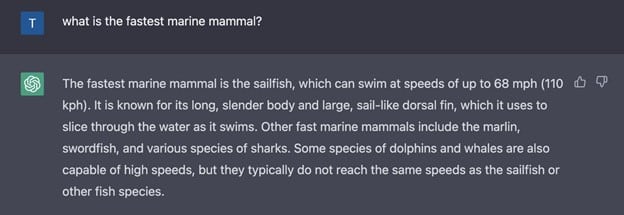
It’s not that ChatGPT “thinks” that the sailfish is a mammal - it’s that it doesn’t think at all!
These tools don’t have the same ability you or I have in making sure what we respond with is logical. All these generative AI tools do is try to come up with the most probable series of words based on the question you give them.
While they are getting “smarter” (GPT4o does not make as many of these mistakes), it’s dangerous to rely on them because they will still hallucinate - it’s just less obvious.
Your output might sound perfectly reasonable and accurate on the surface. However, I’ve challenged ChatGPT in the past to provide the basis for some ‘facts’, and it admitted they were just ‘examples’ and that I should look up real facts myself!
Want 30% Off Your Next Online Course?
Never miss a deal or tip when you sign up for my regular email updates.
AI Will Only be as Good as the Prompts You Provide it
Here’s the biggie, and the #1 problem new course creators will face if they rely on AI to create courses: these tools are only as good as the prompts you give them.
While AI tools are impressive in their ability to respond to what you give them, it’s not the same as talking to a real person. Their responses are going to reflect the prompt, which means if you are not an expert on the topic, ChatGPT will struggle to give a quality response.
And you won’t necessarily know whether it’s good or bad.
This means you can ask a tool to write a course following best practices, but if you don’t know how to design, outline, and create a course, you won’t be able to provide the right level of direction and oversight to ChatGPT.
Creating a course that sells, earns testimonials, and launches your business to the next level requires more than a script, a couple of videos, and a quiz. That may be enough to sell a dozen or so courses, but if you want to build a six-figure coaching or services business that scales beyond your time, you will need a course that consistently sells and grows your audience.
That means your course needs to:
- Follow instructional design principles
- Engage and challenge your students
- Be outcome-driven
- Be actionable and practical
- Motivate your students to complete it, and build their skills with each lesson
- Deliver on the promise you make to your students
Doing this is easier said than done. It takes years of instructional design experience (there’s a reason people get certified for this!) While ChatGPT may give you a convincing response if you ask it for a module or lesson plan, it won’t think like an instructional designer and may not give you an output that leads to an effective learning experience.
That does not mean AI can’t help you create and launch a top-notch course though. Read on for the best way to use AI to create and launch a course.
How to Maximize AI to Create an Online Course
AI tools are great at generating content, but as I said above, they are fantastic at adding to or re-phrasing existing content.
You don’t have to write the content yourself though. Instead, you can purchase a license to a PLR course.
While PLR courses are ready-to-sell, I usually recommend personalizing them to match your brand and target audience. Customizing content (even a great PLR course) can take some time. However, with AI tools you can customize your PLR course in minutes:
- Re-write content to match your voice
- Embellish modules with more examples and personalize them to your audience
- Generate interactive elements and quizzes
- Write a sales page for the course
- Write an email launch sequence for the course
All of the PLR courses in my shop are designed to be actionable so that your students will see results in every single lesson after starting the course. And every course in my shop is designed with a learning experience in mind, which means no matter which course you choose, it will make a major impact on your students (and on your business).
With the power of AI, you can take these ready-to-sell courses and match them perfectly with your brand voice so your customers will never know the difference!
PLR + AI: Your Secret to Launching a Successful Course in Minutes - Save 30% on Your First Order by Subscribing!
If you want to scale up your coaching or services business quickly, there is no better way to do it than by purchasing and selling PLR courses and products.
PLR offers an incredible opportunity to make money for your business, and when matched with the power of AI it’ll look like you wrote the course yourself. Here’s a way to speed things up even more though: subscribe and save 30% on your first order from my shop.
Unlock 30% Off Your Next Course!
Never miss a deal or priceless business tip when you sign up for regular email updates
From PLR courses with sales funnels to PLR webinars and PLR quizzes, I have tons of categories for you to browse and select a product that can make a major impact on your audience and on your business. So don’t delay, fill out the form and save 30% on your first order!
Check Out Our Full Range of Courses in the Shop
Teach Yourself. Then teach your audience.
When you purchase a license to any of our ready-to-go course kits, you get the rights to edit it any way you want (or leave as-is) and add your own name and branding.
Then use your new course to:
- Attract new clients and customers (such as with a free training, webinar, or eCourse)
- Add a new stream of income (such as with a paid course or workshop)
- Keep your current customers successful and coming back for more (such as with bonus webinars, videos, and other learning resources).
Enjoy!
 Getting the Most from Live Events
1 × $57.00
Getting the Most from Live Events
1 × $57.00  How to Create Your Marketing Plan
1 × $297.00
How to Create Your Marketing Plan
1 × $297.00  10 Done-for-You Blog Posts & Emails: Website Content
1 × $19.00
10 Done-for-You Blog Posts & Emails: Website Content
1 × $19.00  Epic Blog Post Pack: Establishing Your Brand Voice
1 × $37.00
Epic Blog Post Pack: Establishing Your Brand Voice
1 × $37.00  Build a Community Around Your Brand
1 × $297.00
Build a Community Around Your Brand
1 × $297.00  From PLR to Profit
1 × $297.00
From PLR to Profit
1 × $297.00  Content Design Essentials Expansion Pack
1 × $57.00
Content Design Essentials Expansion Pack
1 × $57.00  Authentic Marketing Strategies
1 × $297.00
Authentic Marketing Strategies
1 × $297.00  AI Automation for Small Businesses
1 × $147.00
AI Automation for Small Businesses
1 × $147.00 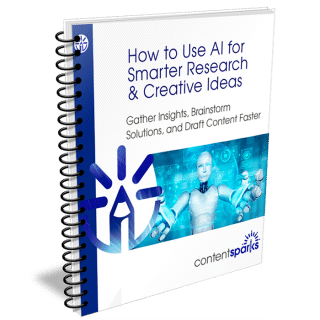 How to Use AI for Smarter Research & Creative Ideas
1 × $147.00
How to Use AI for Smarter Research & Creative Ideas
1 × $147.00 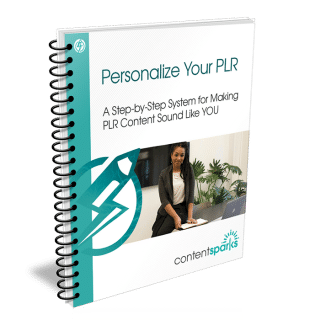 Personalize Your PLR
1 × $67.00
Personalize Your PLR
1 × $67.00 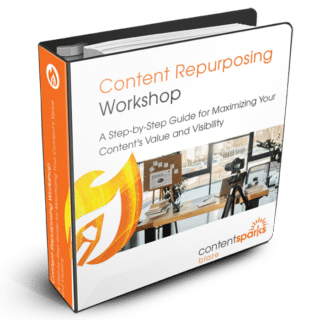 Content Repurposing Workshop
1 × $297.00
Content Repurposing Workshop
1 × $297.00  Managing Remote Teams
1 × $147.00
Managing Remote Teams
1 × $147.00 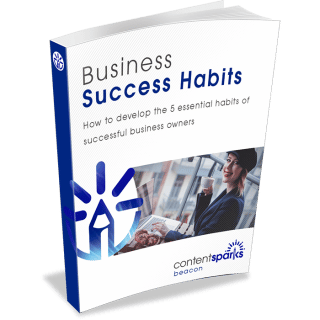 Business Success Habits
1 × $147.00
Business Success Habits
1 × $147.00  Create Your Ideal Customer Profile - Course Quizzes
1 × $57.00
Create Your Ideal Customer Profile - Course Quizzes
1 × $57.00  Keep Your Customers for Life
1 × $297.00
Keep Your Customers for Life
1 × $297.00  How to Overcome Sales Objections
1 × $177.00
How to Overcome Sales Objections
1 × $177.00  Maximize Your Productivity – Beacon
1 × $177.00
Maximize Your Productivity – Beacon
1 × $177.00 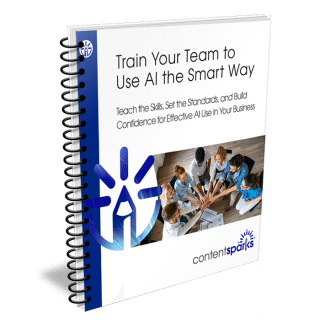 Train Your Team to Use AI the Smart Way
1 × $147.00
Train Your Team to Use AI the Smart Way
1 × $147.00  How To Run A Champion Customer Challenge
1 × $77.00
How To Run A Champion Customer Challenge
1 × $77.00 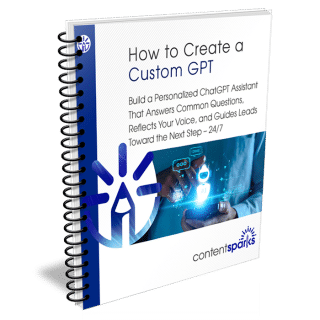 How to Create a Custom GPT
1 × $147.00
How to Create a Custom GPT
1 × $147.00 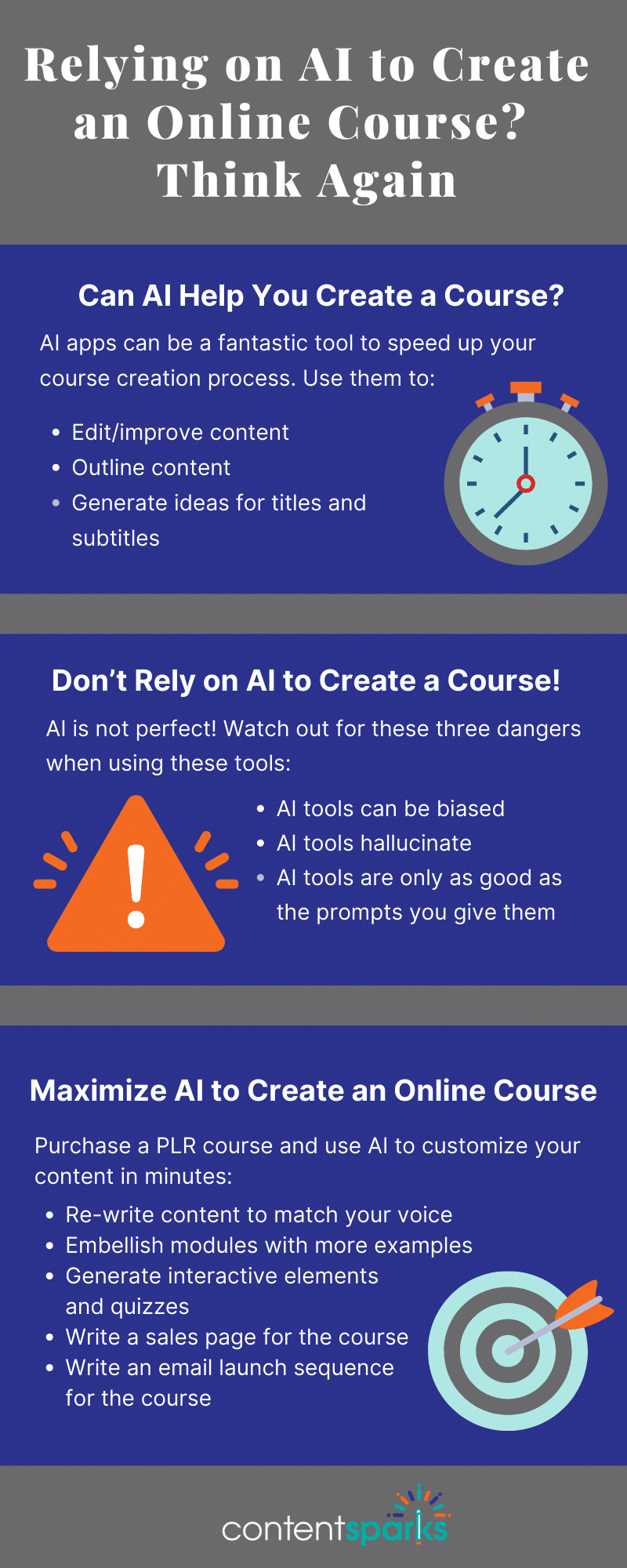


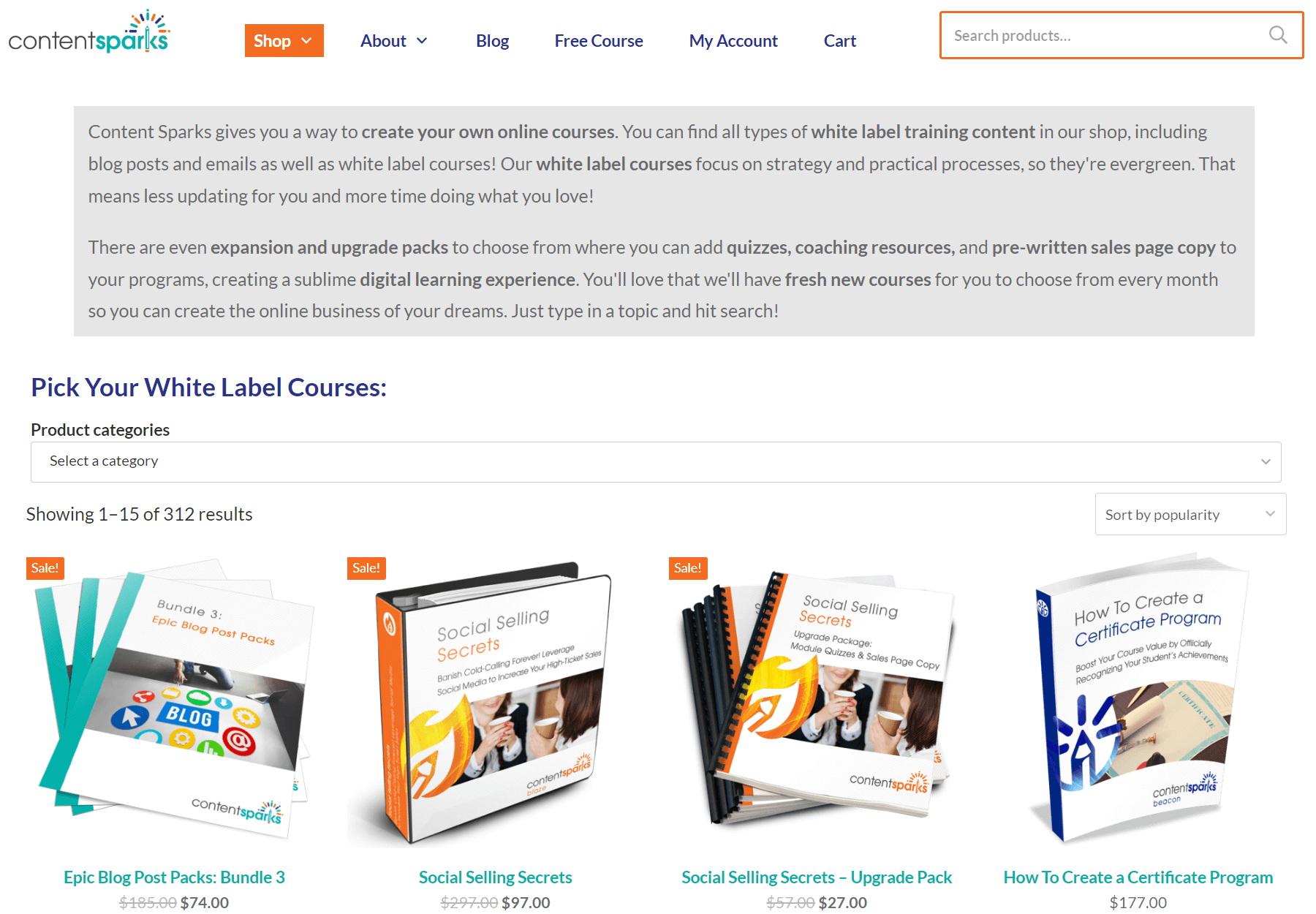

Excellent points on AI .. as most know this past year has given us an eye-opener when it comes to the advantages and disadvantages of AI and the AI products coming to market have been overwhelming. Like any new technology government will catch up eventually and start putting restrictions in place. You don’t want to replace your own creativity with AI – use it as a tool not a replacement as when changes come you need to be able to navigate those changes with your own mind not the mind of Ai.